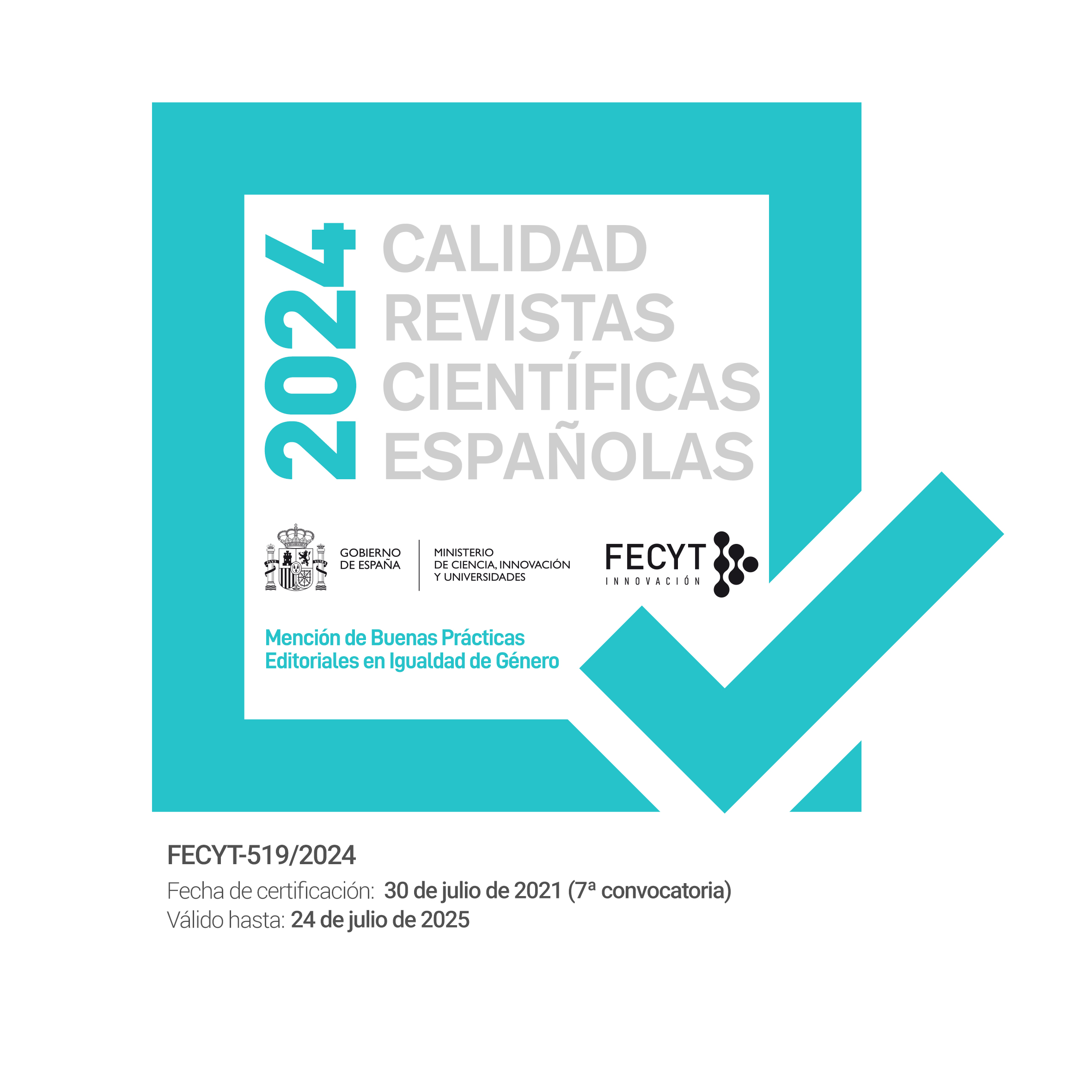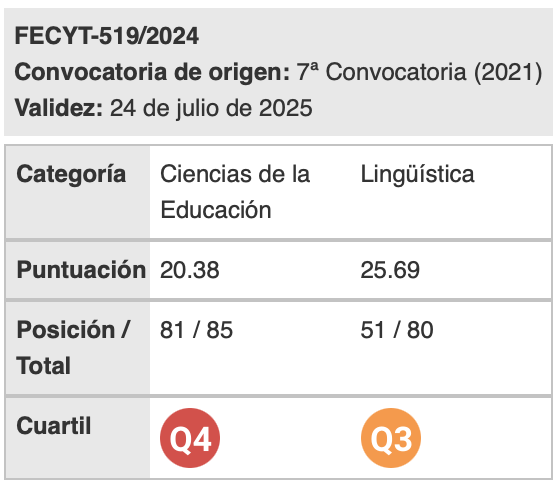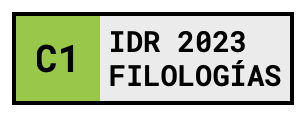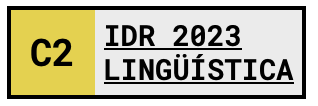Quality Perceptions and Professional Status: The Impact of Extrinsic Information on Translation Editing
Palabras clave:
calidad, percepción, traducción, estatus profesional, localización, factores extrínsecosResumen
Si bien es cierto que el conocimiento existente en torno a la calidad en traducción y localización es muy amplio, la cuestión de cómo se percibe esta en relación con factores de tipo extrínseco no lo es tanto. Este artículo presenta algunas posturas existentes en torno a la calidad de la traducción según distintas perspectivas teóricas en el ámbito de los Estudios de Traducción y se centra en observar cómo la información de tipo extrínseco que se proporciona al revisor en torno al estatus profesional del traductor le puede llegar a influir a la hora de llevar a cabo el proceso de corrección de una traducción.
En esta línea, el presente artículo detalla los resultados de la segunda parte de un estudio dividido en dos etapas. La primera permitió mostrar cómo los participantes revisores se vieron influidos por factores extrínsecos cuando se les pidió seleccionar la traducción que preferían. Se observó, además, que los factores extrínsecos influyeron en mayor medida en aquellos participantes con menos experiencia. En la segunda parte, detallada a lo largo de este artículo, se solicitó a los participantes que corrigieran e introdujeran modificaciones en las traducciones seleccionadas. Posteriormente, se categorizaron los cambios realizados (en relación con la gramática, la ortografía, el sentido, etc.) a partir de análisis de frecuencia y tablas cruzadas. Algunos de los factores para llevar a cabo la tabulación cruzada incluyeron los niveles de experiencia de los participantes y la información extrínseca sobre el estatus profesional del traductor.
Descargas
Citas
Akerlof, G. A. (1970). The Market for “Lemons”: Quality Uncertainty and the Market Mechanism. The Quarterly Journal of Economics, 84(3), 488–500.
Al-Qinai, J. (2000). Translation Quality Assessment: Strategies, Parametres and Procedures. Meta, 45(3), 497-519.
Baker, M. (1992). In Other Words. A Coursebook on Translation. London & New York: Routledge.
Brunette, L. (2000). Towards a Terminology for Translation Quality Assessment. The Translator, 6(2), 169-182.
Catford, J. (1965). A Linguistic Theory of Translation. Oxford: Oxford University Press.
Chesterman, A., & Wagner, E. (2002). Can Theory Help Translators? A dialogue between the Ivory Tower and the Wordface. Manchester, UK & Northampton, MA: St. Jerome.
Dreyfus, S.E. & Dreyfus, H.L. (1980). A five-stage model of the mental activities involved in directed skill acquisition. Operations Research Center.
Drugan, J. (2013). Quality in Professional Translation. Assessment and Improvement. London & New York: Bloomsbury.
Dunne, K.J. (2006). Putting the cart behind the horse: Rethinking localization quality management. In K.J. Dunne (Ed.), Perspectives on Localization. John Benjamins Publishing Company: Amsterdam/Philadelphia, 95–117.
Eraut, M. (2000). Non-formal learning and tacit knowledge in professional work. The British Journal of Educational Psychology, 70, 113–136.
García, I. (2014). Training Quality Evaluators. Revista Tradumàtica: tecnologies de la traducció, 12, 430–436.
Golder, P. N., Mitra, D., & Moorman, C. (2012). What Is Quality? An Integrative Framework of Processes and States. Journal of Marketing, 76, 1–23.
Hansen, G. (2010). Translation ‘errors’. In Y. Gambier & L. van Doorslaer (Eds.), Handbook of Translation Studies: Volume 1 (pp. 385–388). Amsterdam: John Benjamins.
Hatim, B. & Mason, I. (1990). Discourse and the Translator. London: Longman.
Havumetsä, N. (2012). The Client Factor: A Study of Clients’ Expectations Regarding Non-Literary Translators and the Quality of Non-Literary Translations. Unpublished thesis, University of Helsinki.
Hermans, T. (1985). Translation Studies and a New Paradigm. In T. Hermans (Ed.), The Manipulation of Literature. Studies in Literary Translation (pp. 7–15). London: Croom Helm.
House, J. (2015). Translation Quality Assessment: Past and Present. London & New York: Routledge.
Jiménez Crespo, M.Á. (2011). From many one: Novel approaches to translation quality in a social network era. Linguistica Antverpiensia New Series - Themes in Translation Studies: Translation as a Social Activity - community translation 2.0, 2, 131–152.
Kelly, N. & DePalma, D.A. (2008). Non-Standard Views on Industry Standards. Common Sense Advisory: Lowell, Massachusetts.
Kelly, N. & DePalma, D.A. (2009). Eliminating Roadblocks to Translation Quality: Practical Steps to Improve Translated Output. Common Sense Advisory: Lowell, Massachusetts.
Lambert, J., & Van Gorp, H. (1985). On Describing Translations. In T. Hermans (Ed.), The Manipulation of Literature. Studies in Literary Translation (pp. 42–53). London: Croom Helm.
Lefevere, A. (1992). Translation, Rewriting and the Manipulation of Literary Fame. London & New York: Routledge.
Muñoz Martín, R. (2009). Expertise and environment in translation. Mutatis Mutandis, 2(June), 24–37.
Neubert, A., & Shreve, G. M. (1992). Translation as Text. Kent: Kent State University.
Newmark, P. (1991). About Translation. Clevedon: Multilingual Matters.
Nida, E. (1964). Towards a Science of Translation. Leiden: Brill.
Nord, C. (2018). Translating as a Purposeful Activity: Functionalist Approaches Explained. Manchester: St. Jerome Publishing.
O’Brien, S. (2012). Towards a Dynamic Quality Evaluation Model for Translation. The Journal of Specialised Translation, 17, 55–77.
Pérez-González, L. & Susam-Saraeva, Ş. (2012). Non-professionals Translating and Interpreting. The Translator, 18(2), 149–165.
Pym, A. (2010). Exploring Translation Theories. London & New York: Routledge.
Reiss, K. (2000). Translation Criticism: The Potential and Limitations. (E.F. Rhodes, Trans). Manchester: St Jerome.
Reiss, K., & Vermeer, H. J. (2013). Towards a General Theory of Translational Action: Skopos Theory Explained. (C. Nord, Trans.). London & New York: Routledge.
Shreve, G.M. (2002). Knowing translation: cognitive and experiential aspects of translation expertise from the perspective of expertise studies. In A. Riccard (Ed.), Translation Studies: Perspectives on an Emerging Discipline, University Press: Cambridge, 150–171.
Txabarriaga, R. (2009). Best Practices for Client Review Processes. Common Sense Advisory: Lowell, Massachusetts.
Toury, G. (1978). The Nature and Role of Norms in Literary Translation. In J. S. Holmes, J. Lambert & R. Van den Broeck (Eds.), Literature in Translation: New Perspectives in Literary Studies (pp. 83–100). Leuven: Acco.
Vinay, J. P., & Darbelnet, J. (1958). Stylistique Comparée du Français et de L’Anglais. Méthode de traduction. Paris: Didier.
Williams, M. (2009). Translation Quality Assessment. Mutatis Mutandis, 8(1), 3-23.
Zeithaml, V. A. (1988). Consumer Perceptions of Price, Quality, and Value: A Means-End Model and Synthesis of Evidence. The Journal of Marketing, 52(3), 2–22.
Descargas
Publicado
Cómo citar
Número
Sección
Licencia
Aquellos autores/as que tengan publicaciones con esta revista, aceptan los términos siguientes:
- Los autores/as conservarán sus derechos de autor y garantizarán a la revista el derecho de primera publicación de su obra, el cuál estará simultáneamente sujeto a la Licencia de reconocimiento de Creative Commons que permite a terceros compartir la obra siempre que se indique su autor y su primera publicación esta revista.
- Los autores/as podrán adoptar otros acuerdos de licencia no exclusiva de distribución de la versión de la obra publicada (p. ej.: depositarla en un archivo telemático institucional o publicarla en un volumen monográfico) siempre que se indique la publicación inicial en esta revista.
- Se permite y recomienda a los autores/as difundir su obra a través de Internet (p. ej.: en archivos telemáticos institucionales o en su página web) antes y durante el proceso de envío, lo cual puede producir intercambios interesantes y aumentar las citas de la obra publicada. (Véase El efecto del acceso abierto).

Revista de Lenguas para fines específicos is licensed under a Creative Commons Reconocimiento-NoComercial-SinObraDerivada 4.0 Internacional License.























